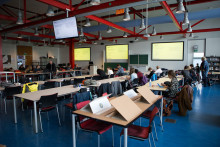With Italy already on lockdown as a result of the coronavirus, there may come a moment when lecturers and researchers in the Netherlands will be forced to work from home here as well.
This raises an important question: will the network be able to handle the extra pressure? Of course, SURF cannot give any guarantees. ‘The Netherlands has never before been confronted with a situation where the entire educational sector had to work from home. It is unprecedented’, says spokesperson Lonneke Walk.
Less traffic
However, should the situation occur, SURF expects ‘that the capacity of the network should not cause any problems’.
It helps that students generally do not connect to their institution’s network from home. ‘This means that their internet traffic does not run via the SURF network, as a result of which there will probably even be less traffic on the SURF network.’
Staff are quite another matter. If they work from home, their internet often runs via the servers of their institution, thanks to a VPN connection. Usually, working from home does not cause any problems, says SURF, and the connections between the institutions and the internet providers are ‘generously dimensioned’. In other words, the extra traffic will not be an issue for the internet providers.
VPN capacity
‘The capacity of the institutions’ VPN servers to support the number of concurrent users could become an issue’, says Walk. In some cases, these servers are ‘dimensioned’ to the number of people who normally work from home. Too many users will overload the servers.
SURF provides VPN services (‘eduVPN’) for various institutions. ‘We’re currently exploring what we can do to scale up our capacity,’ Walk says.






